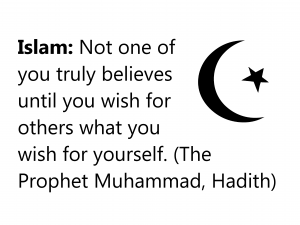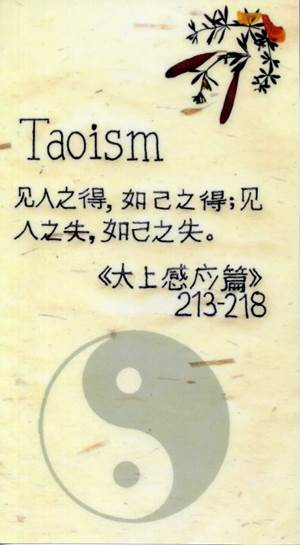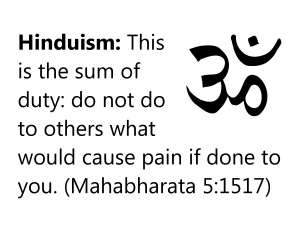Sample questions for use in step 4
In Step 4, the participants are invited to do individual reflection in response to two or three questions provided by the facilitator. The planning group is responsible for creating these reflection questions. To aid the planning group in this task, numerous sample questions are listed below, divided into three categories:
a) the message of the Golden Rule
b) the message of the Golden Rule for you
c) the Golden Rule & its implications for society
a) The message of the Golden Rule
- What is the message of the Golden Rule?
- A similar moral principle is expressed in the Sacred Writings of these 13 religious traditions. What conclusions can you draw from this fact?
- Can you see differences and similarities among the 13 Sacred Texts? What are they?
- Virtually all religions and spiritual traditions emphasize love and compassion for neighbour. How, in your opinion, does this universal teaching relate to the message of these Sacred Writings?
- Are you aware of the title or message of a TV program, book or popular song which expresses the same idea as the Golden Rule? Explain.
b) The message of the Golden Rule for you
- Which expression of the Golden Rule do you like the best? Why?
- How would you express the Golden Rule in your own words?
- Think of one occasion when someone treated you in the spirit of the Golden Rule. When was that? Who was involved? What was that like for you? How did you feel? How do you understand the behaviour of the other party involved in this incident?
- Think of one occasion when you treated someone in the spirit of the Golden Rule. When was that? Who was involved? What was that like for you? How did you feel? What is your sense of the other party’s reaction to your behaviour in that situation?
- Think of one occasion when someone treated you in a manner that violated the Golden Rule. When was that? Who was involved? What was that like for you? How did you feel? How do you understand the behaviour of the other party involved in that incident?
- Think of one occasion when you treated someone in a manner that violated the Golden Rule. When was that? Who was involved? What was that like for you? How did you feel? What is your sense of the other party’s reaction to your behaviour in that situation?
- Did anything in these Sacred Writings get you thinking? Identify it. Did it interest, stimulate or energize you? Or, did it irritate, challenge or bewilder you? Why?
- What surprises you about these Sacred Texts? Why? What challenges you? Puzzles you? Why?
- What insights or good ideas come to you as you reflect on these Sacred Writings?
- What doubts or questions are raised for you as you ponder these Sacred Texts?
- Has anything in these Sacred Writings so caught your interest that you might want to investigate it more fully? What? Why?
 Is there something you can name within your workplace (or school, family, city, etc.) that promotes or prevents the practice of the Golden Rule?
Is there something you can name within your workplace (or school, family, city, etc.) that promotes or prevents the practice of the Golden Rule?- If you were to live by the Golden Rule each and every day, what would be different in your life? Your personal life? Family life? Work Life? Community Life? etc.
- Can the Golden Rule be realistically applied in day-to-day life? Why or why not? Can you think of a good example from your experience? Describe it.
- Do you belong to one of the 13 spiritual traditions represented in this collection of Sacred Texts? If so, how do you understand your tradition’s version of the Golden Rule in light of the other 12? And how do you understand the other 12 in light of yours?
- Some people argue that the Golden Rule contains a profound call to solidarity with neighbor, a profound call to empathy and compassion for all. As you read and reflect on these 13 Sacred Writings, do you believe it is really possible for you “to get inside another person’s skin”, “to walk in your neighbor’s moccasins”, to feel the joy and pain of another person? Explain.
- In light of these13 Sacred Writings, what is your reaction to the following statement: “my search for happiness, meaning and freedom has everything to do with my commitment to bringing about your happiness, your meaning and your freedom”?
- Do you see ways in which these Sacred Texts could be helpful to yo in terms of prayer and meditation? Explain.
- As a result of my reflections on these Sacred Writings, I feel moved to……
c) The Golden Rule’s implications for society
- What could things be like if everyone behaved according to the Golden Rule? Why is it that sometimes we don’t behave according to the Golden Rule?
- Do you think that people generally live by the Golden Rule? Why? Why not? If not, what Rule do you think many people do live by?
- How do people usually treat each other at work (school, home, etc.)? Why is that so? How might the Golden Rule make a difference?
-

Taoist Golden Rule in Chinese language. English translation: “Regard your neighbour’s gain as your own gain, and your neighbour’s loss as your own loss.”
To what current issue in your city or country might the Golden Rule offer a solution? How so?
- Do you think that these Sacred Writings could be helpful in promoting conversation, communication and harmony within a family? Why or why not? Do you think that these writings could be helpful in promoting such communication among families, including families of various faiths? Why or why not?
- Select a social, political, economic or religious issue that interests you. How might these Sacred Writings contribute to your thinking about or acting on this issue?
- How, in your opinion, do these Sacred Texts challenge us in terms of our relationships with people who are hurting e.g. the hospitalized, the imprisoned, the abused, the homeless, refugees etc.?
- Do you think that these Sacred Writings could be helpful in bringing about equality between women and men? Why or why not?
- Do you think that these Sacred Texts could be helpful in healing a societal disease known as racism? Why or why not?
- Do you think that these Sacred Writings could be helpful in promoting a deeper appreciation of racial, cultural and religious diversity? Why or why not?
- From the domestic to the international level, there appears to be a growing reliance on violence to resolve conflict? Do you think that these Sacred Writings could be helpful in promoting a non-violent approach to conflict-resolution? Why or why not?
- For all beings on this planet, ecological destruction is a threatening development. Do you think that these Sacred Texts could be helpful in efforts to protect and heal Mother Earth? Why or why not?
- Do you think that these Sacred Texts could be helpful in efforts to promote social and economic justice for all? Why or Why not?
- Do you see any connection between the message of these 13 Sacred Writings and the UN’s Universal Declaration of Human Rights? Why or Why not?
- Across the planet, thousands of people including educators, humanitarians and religious people are working to develop a Global Ethic (www.global-ethic.org). This effort to develop a universal ethic, which calls upon the wisdom of the world’s many religions, considers the Golden Rule to be a key reference point. Here, the Golden Rule is not just a moral ideal for relationships between people but also for relationships among nations, cultures, races and religions. Do you think that the development of a Global Ethic is important? Why or why not? If yes, do you think that the Golden Rule could make an important contribution to this universal ethic? Why or why not?
- Do you think that these Sacred Texts could be helpful in efforts to promote interfaith dialogue? Why or why not?
- Where do you think there is a special need for these Sacred Writings today? Why?

